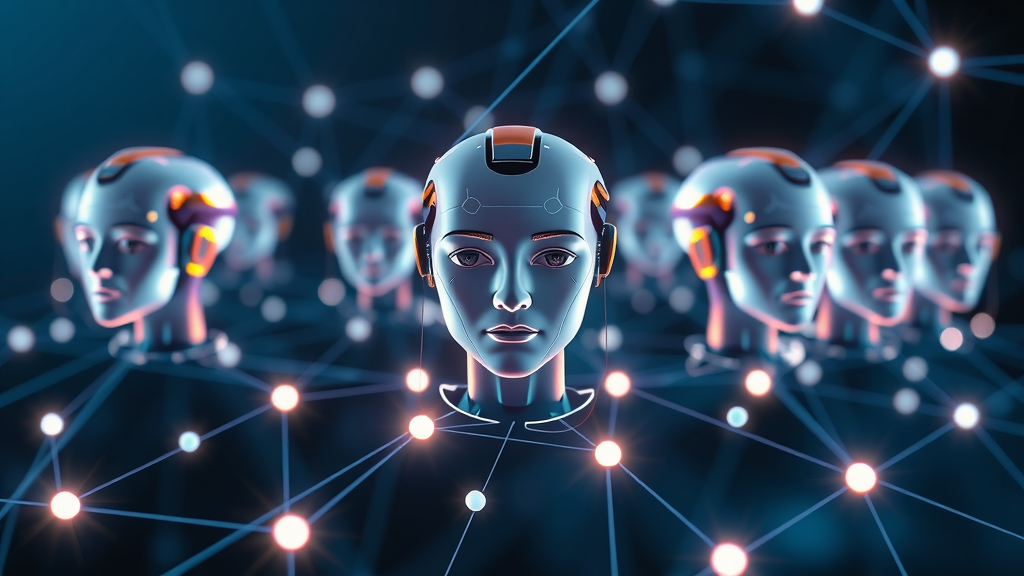Did you know? By 2025, over 60% of local businesses will integrate agent-based AI systems into their marketing workflows—never has intelligence been so accessible. This shift is quietly transforming local marketing—and chances are, your competition is getting ready.
Unlocking the Potential: Agent-Based AI Systems Transform Local Business Marketing
"By 2025, over 60% of local businesses will integrate agent-based AI systems into their marketing workflows—never has intelligence been so accessible."
In today’s fast-evolving digital world, agent-based AI systems are quickly becoming an essential asset for local business marketing. These systems, built around the concept of the intelligent agent, are designed to think, analyze, and act on behalf of a business owner. Imagine having a tireless team that monitors trends, interacts with customers, and runs campaigns automatically. Tools like agentic AI, AI agents, and generative AI now enable small businesses to compete with big brands, offering smarter, faster, and more personalized marketing solutions. In this article, we’ll uncover how these advanced ai systems give local businesses a competitive edge, explore practical use cases, and provide an easy guide to getting started.

What You'll Learn About Agent-Based AI Systems
- The fundamentals of agent-based AI systems and agentic AI
- Key features distinguishing intelligent agent and agentic systems
- Practical use cases of AI agents in marketing
- Overview of relevant machine learning techniques involved
- Evaluation criteria for choosing effective agent-based AI systems
- Expert insights and future trends for local businesses
Understanding Agent-Based AI Systems: The Basics
Defining Agent-Based AI Systems and Intelligent Agent Concepts
At the heart of agent-based AI systems is the intelligent agent. Think of an intelligent agent as a smart digital assistant that can observe its environment, reason about the situation, make decisions, and take actions—all with minimal human oversight. In a marketing context, this could mean an AI agent that monitors customer behavior on your website, sends out personalized emails, or adjusts advertising budgets in real time.
These ai systems are not limited to a single function. Instead, they can interact with each other and form agentic systems, networks of smart agents collaborating for more complex tasks like campaign planning or market analysis. The power of agent-based AI comes from their ability to learn and adapt—using technologies such as machine learning, large language models, and generative AI, they continually refine their behavior to maximize results. As a local business owner, embracing agentic AI can mean more than just automation; it’s about having a marketing partner that grows smarter with you.

C AI, Agentic AI, and D AI: Classifications and Distinctions
Not all AI agents are the same. When exploring agent-based AI systems, you’ll come across terms like C AI, agentic AI, and D AI. C AI stands for Collaborative AI, where multiple agents work together, such as customer chatbots seamlessly handing off inquiries. Agentic AI is all about autonomy—think of an agent that not only follows rules but also solves new marketing problems on its own. D AI, or Decentralized AI, refers to smart systems spread across different platforms, perfect for analyzing trends from various data sources at once. By understanding these differences, you can better match ai agents to your business needs and avoid one-size-fits-all solutions.
| Type | Main Features | Example Use Case |
|---|---|---|
| Agentic AI | Autonomous problem-solving, adaptability | Automated lead generation |
| C AI | Collaborative multi-agent systems | Customer service chatbots |
| D AI | Decentralized intelligence | Distributed market analysis |
Agentic System and Agentic AI: How They Reshape Marketing Strategies
Core Principles of Agentic Systems in Marketing
Agentic systems bring a level of intelligence and adaptability previously unseen in local marketing. At their core, these systems continuously analyze customer behavior—from website clicks to social media engagement—then adjust campaigns in real time. Using AI agents powered by generative AI and machine learning, agentic AI can personalize messages for individual customers and streamline the customer journey. This level of adaptive targeting was once reserved for major corporations with vast tech resources. Now, even small businesses can deploy agentic systems to enhance customer engagement, deliver relevant offers, and drive loyalty—all while saving valuable time.
For those interested in the practical side of AI-driven automation, exploring how agent-based systems are already streamlining complex processes in other industries can offer valuable perspective. For example, the healthcare sector is leveraging AI to optimize administrative workflows, as detailed in this guide on AI’s role in transforming prior authorization. These cross-industry insights can inspire new ways to apply agentic AI in your own marketing strategy.

Agentic AI for Local Businesses: Actionable Advantages
- Hyper-personalized campaign automation
- Smart recommendations with machine learning and large language model
- Streamlined multi-channel customer communication
"Implementing agentic AI is no longer optional—it's the linchpin of local market success," says industry expert.
How Do Agent-Based AI Systems Work? Key Components and Technologies
Machine Learning and Language Models in AI Agents
The magic behind modern agent-based AI systems is a blend of machine learning, language models, and advanced frameworks. Machine learning empowers AI agents to recognize patterns in data—whether it’s customer buying habits or seasonal demand spikes—so they can make smarter marketing decisions.
Language models and large language models are responsible for understanding and generating human-like text, making customer interactions more friendly and helpful. Through generative AI, these agents can even create personalized email content, suggest product recommendations, or craft social media posts, giving every business a creative edge. Frameworks like d e, e f, and f ai enable these systems to coordinate multiple AI agents for even more sophisticated marketing strategies.

Architecture of Agentic AI and Multi-Agent Collaboration
True power in agent-based AI systems comes from teamwork: AI agents collaborate, share data, and learn from each other. Architectures like e f, d e, and f ai systems let these agents divide up complex marketing tasks. For example, one agent might handle email targeting, another focuses on social media trends, while a third optimizes ad spend. Over time, these AI agents exchange results and improve together—a process known as reinforcement learning. This multi-agent approach ensures your campaigns stay ahead of the competition, adapting to shifts in the local market and customer needs with minimal manual effort.
Watch this short explainer to see how agent-based AI systems automate local marketing, from data gathering to campaign execution—making smarter business easier for everyone.
People Also Ask About Agent-Based AI Systems
What is an agent-based AI?
Agent-based AI describes AI systems made up of autonomous intelligent agents (like AI agent or agentic AI) that can independently observe, learn, and act in a marketing environment. These agents can set goals, analyze data, and make smart decisions—helping local businesses increase efficiency and reach customers more effectively.

What are the 4 types of AI agents?
The four main types of AI agents are: simple reflex agents, which act on immediate inputs; model-based reflex agents, which use knowledge of past experiences; goal-based agents, which plan actions to achieve set goals; and utility-based agents, which aim to maximize a defined value or outcome. In ai systems, these agents work together to handle everything from routine marketing automation to advanced customer personalization.
What is an example of an agent based system?
A practical example would be a local marketing automation platform powered by agent-based AI systems. Imagine several AI agents working behind the scenes: one segments your customers, one tracks their behavior, and another adapts your advertising in real time. Together, this network ensures your local business campaigns remain effective while you focus on running your shop.
What are the 4 types of AI systems?
The four broad types of AI systems are: reactive machines (simple response), limited memory systems (learning from recent data), theory of mind AI (understanding motives and emotions), and self-aware AI (systems with consciousness). Agent-based AI typically fits within the reactive, limited memory, and—potentially—theory of mind categories commonly used for real-world marketing.
The Agent-Based AI System Framework: Components and Workflow
Setting Up Agentic AI for Local Business Marketing
- Initial strategy and data collection
- Integration of intelligent agents
- System training with generative AI and language models
- Continuous monitoring and optimization

| Component | Purpose | NLP Tech Used |
|---|---|---|
| Perception Module | Data capture & input | Language models |
| Reasoning Engine | Decision making | Machine learning |
| Action Manager | Task execution | Automated scripts |
Agentic AI Use Cases: Real-World Examples for Local Business Owners
Marketing Automation
Agent-based AI systems shine when automating repetitive marketing tasks. For example, agents can schedule and send bulk email campaigns, manage social media posts at optimal times, and analyze advertising performance. This smart automation means fewer manual hours, more consistency, and measurable growth—even for business owners with minimal tech skills. Because these AI agents learn from past campaigns, your marketing constantly improves without extra work.

Intelligent Agent Integrations in Customer Service
Integrating intelligent agent frameworks in customer service gives businesses 24/7 support power. AI chatbots and virtual assistants now answer FAQs, gather feedback, and even process orders, freeing staff for higher-level tasks. As these ai agents learn from each customer interaction through natural language processing and machine learning, their assistance becomes faster and more accurate—translating to higher customer satisfaction and loyalty.
Dynamic Content and Offer Personalization
- Generating localised offers with generative ai
- Personalizing recommendations via large language model analysis
- Real-time content adjustments based on customer behavior

See real business results! This showcase video highlights how local shops, restaurants, and agencies have leveraged agent-based ai systems and the agentic system approach to boost customer engagement, increase marketing efficiency, and achieve growth that once seemed out of reach.
Benefits and Challenges of Agent-Based AI Systems
Key Advantages for Local Business Owners
- 24/7 autonomous campaign management
- Enhanced targeting using NLP and machine learning
- Scalable customer engagement

Common Challenges and Solutions
- Data integration issues—solved with modular agentic AI architecture
- Managing system complexity—leveraging user-friendly ai system interfaces
- Privacy compliance—employing transparent data practices
Evaluating and Choosing the Right Agent-Based AI System for Your Local Business
Critical Features to Look For
- Customizable automation tools
- Comprehensive analytics dashboard
- Reliable support and integration with existing ai systems
Vendor Comparison Table
| Vendor | Strengths | Target use case |
|---|---|---|
| AI Marketer Pro | Advanced analytics, integrations | Small retailers |
| EngageBot | Strong NLP, multichannel | Restaurants, service providers |
| AdSmart AI | Cost-effective automation | Boutiques, local agencies |
FAQs: All About Agent-Based AI Systems
-
How do agentic ai and agentic system differ?
While both focus on autonomy, agentic AI refers to the underlying intelligence and problem-solving ability, while an agentic system is the broader network or structure organizing multiple agents for more complex tasks. -
Can a small business implement agent-based ai systems affordably?
Yes! Many solutions are now affordable and scalable, designed for local businesses with modest budgets, and offer pay-as-you-grow plans so you can start small and add features as needed. -
What skills do I need to operate an ai system?
Most modern agent-based AI systems come with user-friendly dashboards and wizards. Basic tech and marketing skills are helpful, but even non-technical owners can manage daily operations with the right training. -
Is generative ai necessary for local marketing?
While not required, generative AI can greatly boost personalization by crafting customized offers and messages at scale, making your marketing efforts stand out. -
Are agent-based ai agents safe for customer data?
Reputable vendors build systems with strong privacy controls and data practices. Always ensure your agent-based AI solution complies with local privacy laws and industry best practices.

Key Takeaways for Local Business Owners Considering Agent-Based AI Systems
- Agent-based AI systems represent a transformative shift in marketing automation
- Integrating intelligent agents in marketing can drive efficiency and measurable growth
- Practical adoption depends on vendor choice, system features, and readiness for automation
- Continuous learning—via generative AI and machine learning—fuels ongoing success
In Conclusion: The Future of Agent-Based AI Systems for Your Marketing
Local business owners who embrace agent-based AI systems position themselves at the forefront of marketing innovation. Now is the time to explore how agentic ai, intelligent agent integrations, and advanced ai agents can unlock growth and operational agility for your business.
If you’re eager to deepen your understanding of how AI is revolutionizing business processes beyond marketing, consider exploring the broader impact of artificial intelligence in sectors like healthcare. Our article on how AI in prior authorization improves healthcare efficiency reveals how similar agent-based approaches are driving operational excellence and innovation. By learning from these advanced applications, you can uncover new strategies to future-proof your business and stay ahead in the rapidly evolving AI landscape.
We'd love to hear what you think about this! Please add your comments below...
To deepen your understanding of agent-based AI systems and their transformative impact on local business marketing, consider exploring the following resources:
-
“Agentic AI”: This article provides an in-depth look at autonomous systems capable of making decisions and performing tasks with minimal human intervention, highlighting their applications in various industries. (en.wikipedia.org)
-
“Agents in AI - GeeksforGeeks”: This resource offers a comprehensive overview of different types of AI agents, including simple reflex agents, model-based reflex agents, goal-based agents, and utility-based agents, explaining their functionalities and use cases. (geeksforgeeks.org)
These resources will provide valuable insights into the principles and applications of agent-based AI systems, equipping you with the knowledge to leverage these technologies effectively in your marketing strategies.
 Add Row
Add Row  Add
Add 










Write A Comment